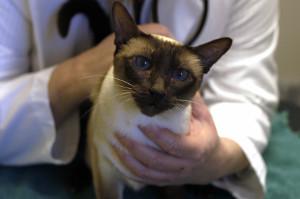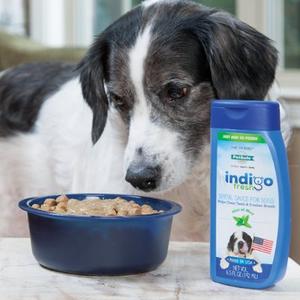The world of human health supplements has become well populated during the last decade with a dizzying array of probiotic and prebiotic products that tout multiple benefits. These products include not only supplements, but beneficial bacteria added to, or naturally occurring in, foods that are finding a new health-conscious consumer audience.
With all the attention on the potential benefits of probiotics and prebiotics for people, it wasn’t long before attention turned to the potential benefits for our pets. After all, they have guts, too!
What are prebiotics and probiotics?
 The widely accepted definition of a probiotic is “live microorganisms that confer a health benefit on the host when administered in adequate amounts.”
The widely accepted definition of a probiotic is “live microorganisms that confer a health benefit on the host when administered in adequate amounts.”
Prebiotics are defined as “nondigestible food ingredients that promote the growth of beneficial microorganisms in the intestines.”
Prebiotic might be an unfamiliar term, but most of us already are acquainted with many types of prebiotics. One of the most common prebiotics is dietary fiber.
Synbiotics are combinations of probiotics and prebiotics in one supplement, or found in a combination of foods eaten together. Yogurt and honey is an example of a synbiotic, as are beans and pickles.
 How do probiotics and prebiotics work?
How do probiotics and prebiotics work?
Millions of bacteria live in our gastrointestinal tract, and the same is true for our companion animals. Some gut bacteria are helpful to our pets, assisting in the digestion of food and keeping harmful bacteria from getting established. However, diseases (both in and out of the gastrointestinal tract) can disrupt this community, allowing harmful bacteria to expand.
Drug therapy, particularly with antibiotics, also can disrupt gut bacteria. Probiotics are designed to introduce “good” bacteria back into the gastrointestinal tract, helping the gut environment to return to normal.
Prebiotics work by providing bacteria with the fuel they need to thrive. In the case of dietary fiber, bacteria use indigestible fiber as fuel, and the byproducts of this process benefit the cells of the gastrointestinal tract.
Is there any evidence that probiotic and prebiotic supplementation is beneficial for dogs and cats?
 The results from a handful of new studies on probiotics and prebiotics are promising. One small study showed probiotics alone were just as effective as steroid and antibiotic therapy in reducing signs of inflammatory bowel disease in dogs. There also is evidence that probiotics are beneficial in dogs with food allergies.
The results from a handful of new studies on probiotics and prebiotics are promising. One small study showed probiotics alone were just as effective as steroid and antibiotic therapy in reducing signs of inflammatory bowel disease in dogs. There also is evidence that probiotics are beneficial in dogs with food allergies.
Other studies suggest that probiotics might be helpful in cases of non-specific diarrhea, such as in cases of dietary indiscretion, when dogs eat something they shouldn’t.
Some studies showed that probiotics are useful in treating diarrhea in shelter cats, and another study showed improvement in stool consistency when cats with chronic diarrhea were supplemented with probiotics.
Morris Animal Foundation has funded several studies looking at the bacterial composition of the canine gastrointestinal tract, and preliminary results from a foundation-funded study suggest that probiotic administration can lessen the side effects of doxorubicin, a commonly used chemotherapeutic agent.
Fiber supplementation (a prebiotic) has long been advocated for dogs and cats with certain types of diarrhea, as well as for diseases such as pancreatic inflammation. Prebiotic therapy alone (other than fiber supplementation) has not been studied extensively.
 Can probiotics or prebiotics be harmful?
Can probiotics or prebiotics be harmful?
One study demonstrated an increase in some harmful gut bacteria in dogs given probiotics. However, veterinary gastroenterologists remain optimistic that these products hold promise in the treatment of many diseases of dogs and cats. More research is needed to determine which “bacteria cocktail” is most beneficial for dogs and cats, and which health conditions could be alleviated with supplementation using these products.
The most common concern with probiotic therapy, though, is some studies don’t support any benefit from their use. The majority of studies don’t show any adverse effects, but probiotics can be expensive and most pet owners don’t want to spend money unnecessarily.
If you are considering adding probiotics and/or prebiotics to your pet’s diet, or you are concerned about a specific health condition that may be helped with supplementation, a visit with your veterinarian can provide you with the information you need to make the best decision for your pet’s health.
Visit Morris Animal Foundation to learn more about our current and past small animal studies and see what the foundation is doing to improve the lives of dogs and cats everywhere.










